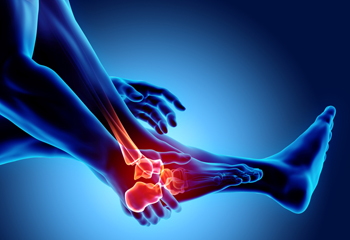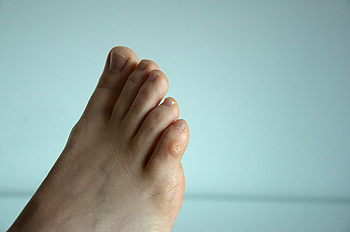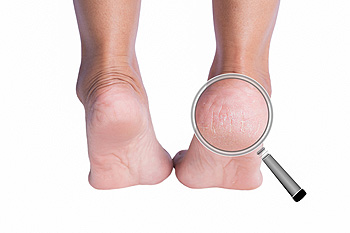
Dr. Kenneth Rosenthal
Dr. Jonathan C. O’Quinn
Dr. Michael J. Price

Dr. Kenneth Rosenthal
Dr. Jonathan C. O’Quinn
Dr. Michael J. Price
Hyperhidrosis is a term that is used to describe excessive sweating. It is known as plantar hyperhidrosis when the feet sweat for the majority of the day. The purpose of sweating is to control the body’s temperature, but sweating can be excessive for several reasons such as genetic factors, hormonal concerns, or medical conditions like anxiety disorders. Having feet that sweat profusely can cause an unpleasant odor, which may lead to embarrassment. Additionally, safety may be compromised as a result of slipping. If you have plantar hyperhidrosis, it is recommended that you speak with a podiatrist who can help you with proper treatment techniques.
If you are suffering from hyperhidrosis contact one of our podiatrists of Eastern Carolina Foot & Ankle Specialists. Our doctors can provide the care you need to attend to all of your foot and ankle needs.
Hyperhidrosis of the Feet
Hyperhidrosis is a rare disorder that can cause people to have excessive sweating of their feet. This can usually occur all on its own without rigorous activity involved. People who suffer from hyperhidrosis may also experience sweaty palms.
Although it is said that sweating is a healthy process meant to cool down the body temperature and to maintain a proper internal temperature, hyperhidrosis may prove to be a huge hindrance on a person’s everyday life.
Plantar hyperhidrosis is considered to be the main form of hyperhidrosis. Secondary hyperhidrosis can refer to sweating that occurs in areas other than the feet or hands and armpits. Often this may be a sign of it being related to another medical condition such as menopause, hyperthyroidism and even Parkinson’s disease.
In order to alleviate this condition, it is important to see your doctor so that they may prescribe the necessary medications so that you can begin to live a normal life again. If this is left untreated, it is said that it will persist throughout an individual’s life.
A last resort approach would be surgery, but it is best to speak with your doctor to find out what may be the best treatment for you.
If you have any questions please feel free to contact our office located in Greenville, NC . We offer the newest diagnostic and treatment technologies for all your foot and ankle needs.
 Arthritis causes inflammation and stiffness in the joints. There are many different types of arthritis, but the types of arthritis that most often affect the feet are osteoarthritis, rheumatoid arthritis, psoriatic arthritis, and gout. Arthritis progressively worsens over time, but the earlier it is detected, the sooner measures can be taken to slow its progression and preserve the health of your feet. The earliest signs of arthritis are joint stiffness, pain, swelling, and warmth. Sometimes the joints may begin to appear deformed or develop bone spurs. If you suspect that you may have arthritis in your feet, please consult with a podiatrist, who can help you manage this condition.
Arthritis causes inflammation and stiffness in the joints. There are many different types of arthritis, but the types of arthritis that most often affect the feet are osteoarthritis, rheumatoid arthritis, psoriatic arthritis, and gout. Arthritis progressively worsens over time, but the earlier it is detected, the sooner measures can be taken to slow its progression and preserve the health of your feet. The earliest signs of arthritis are joint stiffness, pain, swelling, and warmth. Sometimes the joints may begin to appear deformed or develop bone spurs. If you suspect that you may have arthritis in your feet, please consult with a podiatrist, who can help you manage this condition.
Arthritis can be a difficult condition to live with. If you are seeking treatment, contact one of our podiatrists from Eastern Carolina Foot & Ankle Specialists. Our doctors can provide the care you need to keep you pain-free and on your feet.
Arthritic Foot Care
Arthritis is a joint disorder that involves the inflammation of different joints in your body, such as those in your feet. Arthritis is often caused by a degenerative joint disease and causes mild to severe pain in all affected areas. In addition to this, swelling and stiffness in the affected joints can also be a common symptom of arthritis.
In many cases, wearing ill-fitting shoes can worsen the effects and pain of arthritis. Wearing shoes that have a lower heel and extra room can help your feet feel more comfortable. In cases of rheumatoid arthritis, the arch in your foot may become problematic. Buying shoes with proper arch support that contour to your feet can help immensely.
Alleviating Arthritic Pain
It is best to see your doctor for the treatment that is right for your needs and symptoms. Conditions vary, and a podiatrist can help you determine the right method of care for your feet.
If you have any questions, please feel free to contact our office located in Greenville, NC . We offer the newest diagnostic tools and technology to treat your foot and ankle needs.
 Corns are formed by a buildup of hardened and dead skin, normally around the top of the foot, side of the foot, or on the toes. Corns have a cone-shaped core that can press down on the nerve beneath it, leading to pain. The most common cause of corns is wearing poorly fitting shoes that produce excess friction when they rub against the foot. Already existing corns can become inflamed by friction as well. Activities like running and climbing can also lead to corns. The most common solution to treating corns is wearing properly fitted footwear. It is important to wear shoes with a wide toe box, and to avoid shoes that are too tight or too loose. If you have corns on your feet that are persistent or causing you discomfort, or if you are diabetic, it is highly recommended that you consult with your local podiatrist.
Corns are formed by a buildup of hardened and dead skin, normally around the top of the foot, side of the foot, or on the toes. Corns have a cone-shaped core that can press down on the nerve beneath it, leading to pain. The most common cause of corns is wearing poorly fitting shoes that produce excess friction when they rub against the foot. Already existing corns can become inflamed by friction as well. Activities like running and climbing can also lead to corns. The most common solution to treating corns is wearing properly fitted footwear. It is important to wear shoes with a wide toe box, and to avoid shoes that are too tight or too loose. If you have corns on your feet that are persistent or causing you discomfort, or if you are diabetic, it is highly recommended that you consult with your local podiatrist.
Corns can make walking very painful and should be treated immediately. If you have questions regarding your feet and ankles, contact one of our podiatrists of Eastern Carolina Foot & Ankle Specialists. Our doctors will treat your foot and ankle needs.
Corns: What Are They? And How Do You Get Rid of Them?
Corns are thickened areas on the skin that can become painful. They are caused by excessive pressure and friction on the skin. Corns press into the deeper layers of the skin and are usually round in shape.
Ways to Prevent Corns
There are many ways to get rid of painful corns such as:
Treating Corns
Although most corns slowly disappear when the friction or pressure stops, this isn’t always the case. Consult with your podiatrist to determine the best treatment option for your case of corns.
If you have any questions please feel free to contact our office located in Greenville, NC . We offer the newest diagnostic and treatment technologies for all your foot and ankle needs.
 Cracked heels are caused when the skin around your heels splits apart. This can occur for several reasons, from lack of moisture to pressure from standing on your feet all day. When the skin becomes dried out the heels lose their strength and elasticity, and they become hard, dry and flaky. If left untreated, cracks on the heels can become deeper and may even bleed. These deep cracks are known as fissures. Living in a dry climate, walking barefoot, being obese, and wearing shoes with an open back can all increase the risk of developing cracked heels. One simple step to help reduce the risk of cracked heels is to moisturize the feet daily. Drinking plenty of fresh water can also be helpful. Cracked heels can be especially dangerous if you have diabetes or a weakened immune system. It is strongly recommended that you consult with a podiatrist for more information.
Cracked heels are caused when the skin around your heels splits apart. This can occur for several reasons, from lack of moisture to pressure from standing on your feet all day. When the skin becomes dried out the heels lose their strength and elasticity, and they become hard, dry and flaky. If left untreated, cracks on the heels can become deeper and may even bleed. These deep cracks are known as fissures. Living in a dry climate, walking barefoot, being obese, and wearing shoes with an open back can all increase the risk of developing cracked heels. One simple step to help reduce the risk of cracked heels is to moisturize the feet daily. Drinking plenty of fresh water can also be helpful. Cracked heels can be especially dangerous if you have diabetes or a weakened immune system. It is strongly recommended that you consult with a podiatrist for more information.
Cracked heels are unsightly and can cause further damage to your shoes and feet. If you have any concerns, contact one of our podiatrists from Eastern Carolina Foot & Ankle Specialists. Our doctors can provide the care you need to keep you pain-free and on your feet.
Cracked Heels
Cracked heels appear unappealing and can make it harder for you walk around in sandals. Aside from looking unpleasant, cracked heels can also tear stockings, socks, and wear out your shoes. There are several methods to help restore a cracked heel and prevent further damage.
How Do You Get Them?
Dry skin is the number one culprit in creating cracked heels. Many athletes, walkers, joggers, and even swimmers suffer from cracked heels. Age and skin oil production play a role to getting cracked heels as well.
Promote Healing
Over the counter medicines can help, especially for those that need instant relief or who suffer from chronic dry feet.
Wear Socks – Wearing socks with medicated creams helps lock in moisture.
Moisturizers – Applying both day and night will help alleviate dryness which causes cracking.
Pumice Stones – These exfoliate and remove dead skin, which allows for smoother moisturizer application and better absorption into the skin.
Change in Diet
Eating healthy with a well-balanced diet will give the skin a fresh and radiant look. Your body responds to the kinds of food you ingest. Omega-3 fatty acids and zinc supplements can also revitalize skin tissue.
Most importantly, seek professional help if unsure how to proceed in treating cracked heels. A podiatrist will help you with any questions or information needed.
If you have any questions, please feel free to contact our office located in Greenville, NC . We offer the newest diagnostic and treatment technologies for all your foot care needs.